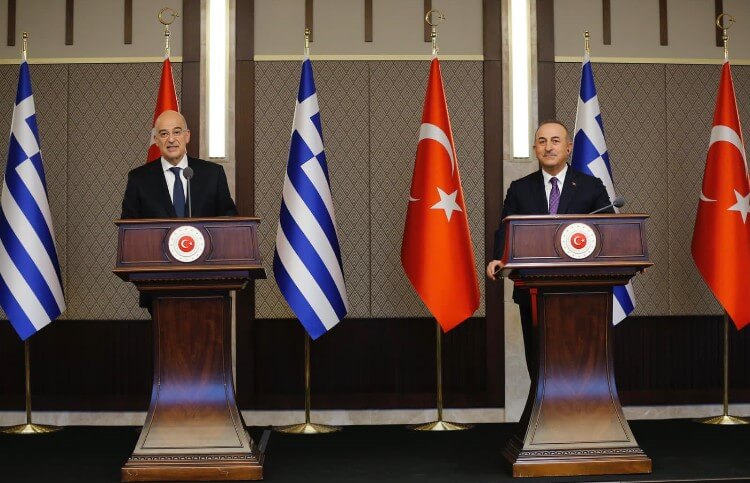Turkish Foreign Minister (FM) Mevlüt Çavuşoğlu said that disputes between Greece and Turkey can be resolved “through constructive dialogue,” during a meet with his Greek counterpart Nikos Dendias in Ankara on Thursday. During the talks, the two FMs discussed claims over the Aegean Sea and the status of Cyprus, as well as problems relating to the Greek Orthodox minority in Turkey, migration, terrorism, and other regional issues.
Both leaders have agreed to meet in Geneva for further talks. Çavuşoğlu said, “We have agreed to meet in Geneva at the end of this month and will continue to work together to improve Turkey-Greece relations.”
It was however reported that the meeting between the two FMs quickly descended into a shouting match, with leaders on both sides hurling accusations at each other. Dendias rebuked his Turkish counterpart for violations of Greek airspace and threatened retaliatory sanctions. Çavuşoğlu rejected these accusations as “unacceptable” and claimed Greece’s diplomatic engagement was insincere and only intended to humiliate Turkey to please the Greek public.
Later, Dendias also met with Turkish President Recep Tayyip Erdoğan at the Presidential Complex in Ankara, where they discussed their competing claims in the eastern Mediterranean. In particular, Erdoğan raised the issue of Cyprus, where he believes Turkey “is being wronged”.
The dispute over the Aegean Sea has been brewing for decades and has led both sides to the brink of war on many occasions. It involves a complex array of issues such as the ownership of territorial waters and airspace, including the question of Exclusive Economic Zones (EEZs).
The eastern Mediterranean has vast energy resources. In fact, the United States (US) Geological Survey estimates that the region holds a reserve of 1.7 billion barrels of oil and 3.5 trillion cubic metres of natural gas. This has led to significant disputes between Greece and Turkey regarding their territorial waters and EEZs in the Aegean Sea.
The United Nations Convention on the Law of the Sea (UNCLOS) regulates the maritime rights of countries. However, Greek and Turkish islands are spread out across the Aegean Sea, resulting in overlapping EEZs and conflicting claims. Moreover, Turkey is not a signatory the UNCLOS and has rejected Greek claims based on the Treaty.
Another point of contention in bilateral relations relates to Cyprus. The island nation is divided into the internationally recognised Republic of Cyprus in the south and Northern Cyprus, which is only recognised by Turkey. The two areas are separated by a UN buffer zone (known as the Green Line) to prevent further clashes. Turkey occupied the island in 1974 and has tried to expand its maritime claim using the borders of Northern Cyprus.
Both sides have tried to resolve the issue through diplomatic channels. The Çavuşoğlu-Dendias meet can be seen as an effort in this direction. Both sides have cautiously agreed to more talks in order to reduce tensions. After the talks, Turkish FM tweeted that he was “expecting more sincere and constructive attitude from Greece.” Dendias said that “a necessary condition for the improvement of bilateral relations between Greece and Turkey was the de-escalation and the avoidance of provocative actions.”

